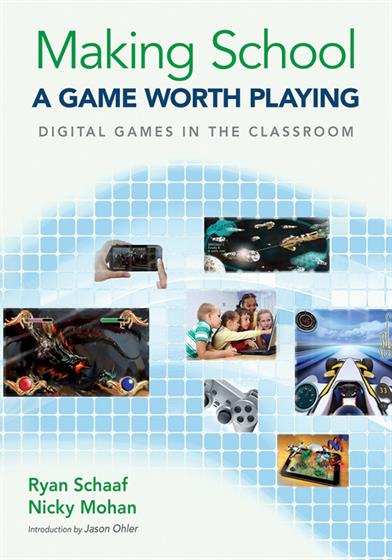Quote by Atsusi “2C” Hirumi, Ph.D., Associate Professor of Instructional Technology, University of Central Florida:
“As video games continue to captivate both children and adults around the world, Ryan Schaaf provides compelling evidence for playing digital games in schools to present academic content and develop essential 21st-century skills. This book goes beyond research and theory to illustrate how teachers can find, evaluate, and integrate digital games with classroom instruction to challenge and present content information in a fun and engaging manner.
“Chapters on how to play games; how games influence 21st-century fluencies; how to find, evaluate, and integrate games; and how to create your own games give teachers a wealth of resources for playing video games in schools and making learning fun at all levels of education. I particularly liked the ‘level’ on the gamification of learning, which gave me great new insights into how to engage learners without the use of video games per se, by leveraging key principles of game-based learning.
“I highly recommend this book for educators across all levels and disciplines. I think it covers the skills and knowledge necessary for novice gamers to integrate the use of video games into their classrooms to facilitate learning, as well as giving experienced gamers a fresh look at the field of game-based learning.”
“As video games continue to captivate both children and adults around the world, Ryan Schaaf provides compelling evidence for playing digital games in schools to present academic content and develop essential 21st-century skills. This book goes beyond research and theory to illustrate how teachers can find, evaluate, and integrate digital games with classroom instruction to challenge and present content information in a fun and engaging manner.
“Chapters on how to play games; how games influence 21st-century fluencies; how to find, evaluate, and integrate games; and how to create your own games give teachers a wealth of resources for playing video games in schools and making learning fun at all levels of education. I particularly liked the ‘level’ on the gamification of learning, which gave me great new insights into how to engage learners without the use of video games per se, by leveraging key principles of game-based learning.
“I highly recommend this book for educators across all levels and disciplines. I think it covers the skills and knowledge necessary for novice gamers to integrate the use of video games into their classrooms to facilitate learning, as well as giving experienced gamers a fresh look at the field of game-based learning.”
Atsusi “2C” Hirumi, Ph.D., Associate Professor of Instructional Technology
University of Central Florida



